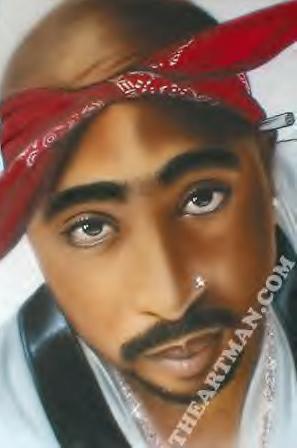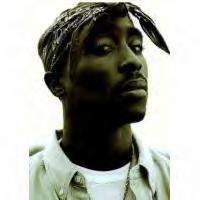| MOVIE
BIASES: Critical acclaim from white reviewers? This oughta
be interesting…
MAJOR PLAYERS: Tupac Shakur, Tabitha Soren (MTV News), and
director Lauren Lazin
I’ll be the first to admit that I’m a Tupac
fan, not a zealot. I’ve got all of his pre-death work
and maybe about half of his hit-or-miss after-death stuff.
There’s no doubt that the man was talented, but I’m
not like one of those people Chris Rock talked about as
having black hero portraits on the mantle of “Martin,
Malcolm, Biggie, and Tupac.” Death tends to mythologize
and I have never bought into the post-mortem deification
of the insanely charismatic, talented, yet contradictory
soul of Tupac Shakur. But if there were ever a movie to
take me to the Church of Shakur, “Resurrection”
is it.
 Eerily
told from beyond the grave in a series of interviews using
an extended one with Tabitha Soren as its touchstone, Tupac
narrates his own story, starting from his embryonic development
in prison up to his final days as a fame-weary yet still
incendiary music icon. With a Black Panther mother Afeni
providing an environment of social activism, Tupac swaggers
through an impoverished upbringing in New York, Baltimore,
and the Bay Area with the confidence and articulation that
won him a slot at the Baltimore of the Arts. At this school,
he was exposed to everything from Shakespeare to ballet
(you should see a young Tupac in a tutu) as well as his
friend for life, Jada Pinkett (they star in a hilariously
ironic karaoke music video to Jada’s future husband’s
hit “Parents Just Don’t Understand”).
After leaving home and his mother devolving into a crack
addiction, failed drug dealer Tupac (“I was the WORST
drug dealer”) is sponsored by dealers, pimps, and
hustlers to pursue rap, eventually latching onto Digital
Underground (“Do the Humpty Hump!”). Eerily
told from beyond the grave in a series of interviews using
an extended one with Tabitha Soren as its touchstone, Tupac
narrates his own story, starting from his embryonic development
in prison up to his final days as a fame-weary yet still
incendiary music icon. With a Black Panther mother Afeni
providing an environment of social activism, Tupac swaggers
through an impoverished upbringing in New York, Baltimore,
and the Bay Area with the confidence and articulation that
won him a slot at the Baltimore of the Arts. At this school,
he was exposed to everything from Shakespeare to ballet
(you should see a young Tupac in a tutu) as well as his
friend for life, Jada Pinkett (they star in a hilariously
ironic karaoke music video to Jada’s future husband’s
hit “Parents Just Don’t Understand”).
After leaving home and his mother devolving into a crack
addiction, failed drug dealer Tupac (“I was the WORST
drug dealer”) is sponsored by dealers, pimps, and
hustlers to pursue rap, eventually latching onto Digital
Underground (“Do the Humpty Hump!”).
From there on it’s a one-way trip to stardom, fusing
a magnetic brand of street knowledge, musical artistry,
social activism and controversy that we have yet to see
since.
 “Tupac: Resurrection” is an engaging piece of
social commentary
“Tupac: Resurrection” is an engaging piece of
social commentary
posing as autobiography. Even as articulately as
Tupac presents his case as the progression of an oppressed
young black male coping with a racist society, the facts
of the time, society, and his very own actions seem to bear
this out. Always a revolutionary in thought and more literate
than most of his rap peers, Tupac’s observations,
analogies, and allegories on life, society, and the meaning
of manhood to a young black man back up his defense that
“I didn’t create thug life—I diagnosed
it.
” His disgust with the Establishment, dual-pronged
artistry (actor/rapper), and accessibility to his own community
(the streets) and others (the media) made him a very likely
black hero, a role he cherished and embraced. From his famous,
highly charged political tirade at the 1993 Indiana Black
Expo to his nationwide initiative of a Code of Thug Life
ethics (thug life meaning the underdogs/black folk to Tupac),
Shakur as a character demonstrates the same leadership abilities—and
challenges—that a Maximus of “Gladiator”
fame does.
But ‘Pac was oh so real. Showing the ability to be
both inspirational and immature, Shakur manages to acknowledge
and even regret some of his more infamous moments (beating
down the Hughes Brothers and other times of industry unprofessionalism)
and outright defiance at others (the prosecution’s
shaky rape case against him in 1994 and his unrepentant
love of women). Largely, he gets a pass from the audience
mostly because of his narrated personal growth and acknowledgement
of life’s complexities, contradictions, and conditions,
like admitting his own sexism within a sexist society (“If
you’re in Hell, you can’t live like an angel.”).
Watching Tupac do a “fair and balanced” deconstruction
of self and his place in and reaction to society’s
overreactive outrage to his message proves that everything
makes sense when it is in context. Clever juxtapositions
of aloof white and black politicians and activists talking
about the state of America’s youth next to Tupac’s
from-the-field reports seem just as ludicrous as they really
are. Yeah, uh, huh; “Just say no,” Nancy.
If anyone were to do his story justice, it would be MTV.
Working in concert with Afeni Shakur’s Amaru Entertainment,
Lazin has crafted a compelling story from tons of their
archival footage that gets all the more watchable and heartbreaking
as we near the end we all know is coming, like a real-life,
relevant version of “Titanic.” As Tupac talks
about how he writes three songs a day upon release from
prison in an impassioned, Keats-like frenzy, you almost
holler at the screen “Write, ‘Pac, write!”
because we anticipate the end of a life as bright and short
as the prolific Romantic-era poet. As the scrawled chyron
dates at the bottom of the screen lead us up to the inevitable,
you begin to get angry that such talent and charisma will
ultimately end before its time to fully mature, à
la Malcolm X. In fact, we need a new word for “charisma”
as Tupac’s excess of it, as evidenced by this film,
has worn it out.
This is such a great, involving film, I will probably never
watch it again. It goes up there on my unwatchable shelf
with “Rosewood,” “Panther,” and
“Bowling to Columbine,” movies so moving, so
incendiary, so real (and REEL) that to watch them again
will only make me mad at the injustice of this world. Whereas
I was just a fan before, I am a zealot now. You will be,
too. Pardon me while I go fish out my copy of “Juice.”
Church is calling.
|